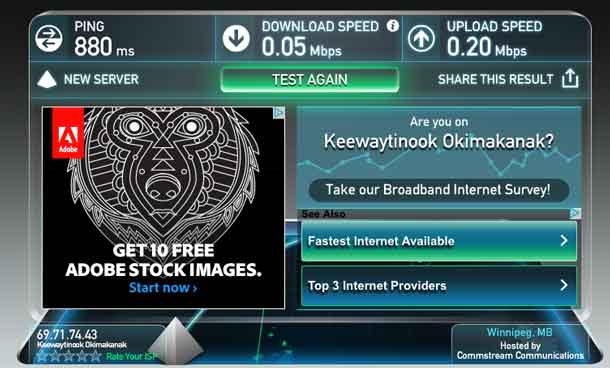
THUNDER BAY – “We cannot continue to keep our people waiting for broadband internet. Now, it is another a basic human right that we do not have. Our children need broadband internet in order to learn what other children learn. Our people need to be able to access tele-health like the rest of Canadians are able. We have waited too long already. Our project has been shovel-ready for years,” states Wayne Slipperjack, Eabametoong First Nation.
Matawa First Nations today announced their plans to commence talks with government officials on new federal broadband funding called Connect to Innovate which was launchedby the Ministry of Innovation, Science and Economic Development (ISED) on December 15, 2016 and tomove forward on establishing a teleco/telecommunications company. These discussions come on the heels of a prior meeting with the Honourable Navdeep Bains, ISED Minister, on October 13, 2016 and the Canadian Radio-Television and Telecommunications Commission (CRTC) decision on December 20,2016 declaring broadband internet a basic service that all Canadians should have regardless of wherethey live. Matawa First Nation Chiefs and the Matawa Broadband Working Group will be present for this week’s talks.
“While it has taken some time for our voices to be heard, I believe that after the Matawa Chiefs met with the Honourable Navdeep Bains on October 13, 2016 to talk to him about the disparities that are caused by the lack of broadband in our Nations, the ISED Minister has listened,” says David Paul Achneepineskum, CEO – Matawa First Nations Management.
On Wednesday, January 18, 2017, they will be meeting with Assistant Deputy Ministers offices of theprovincial and federal governments to discuss with respect to their projectexceeding $60 million to connect 5 remote First Nations. It will be the first time that new players from government will be around the table. It will be an opportunity for direct interface with officials administering the Connect to Innovate program. Matawa First Nations will be applying to this program for capital funding before the March 13, 2017 deadline.
Currently, they rely on an outdated, dysfunctional and expensive satellite and microwave telecommunications system that is riddled by blackouts and breakdowns. In the past, they have drawn attention to the hardships the lack of broadband connectivity has on their communities including the ability to do business like reporting on funding, providing students with web -based teaching resources in their schools, ability to conduct banking, ability to access government services, including tele-health, etc. They have been calling for full support for broadband connectivity since 2014, and, in advance of the 2016 federal budget this past March. In addition, they have asked that government broadband connectivity funding programs remove barriers to access.
“Coupled by the CRTC’s in December declaring broadband internet a basic human right, I believe that shifts in government broadband connectivity programs will be positive for our First Nations,” comments Harvey Yellowhead, Nibinamik First Nation.







